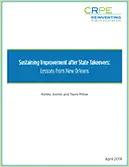In the wake of Hurricane Katrina in 2005, Louisiana’s Recovery School District took over responsibility for most of New Orleans’ public schools. In 2018 the state takeover came to an end. For the first time since Katrina, nearly all of the city’s public schools are in the hands of the Orleans Parish School Board. We set out to understand how the return to local control has shaped the trajectory of education in the city, with an eye toward implications for other states and localities facing similar transitions.
We conducted two rounds of interviews, in 2016 and 2018, with local board members, current and former district staff, charter school leaders and board members, community-based advocates, and state officials. Our interviews focused on understanding how the shift to local control has shaped the role of key government officials and their partners in the nonprofit sector, how local leaders are responding to the demands generated by local control, and what concerns people have about the future of education in New Orleans.
State and local leaders took numerous steps to ensure that a return to local control did not spell an end to the conditions enabling the academic improvements that occurred under state control. We find, in large part, these preparations had their intended effects. For now, the reforms are insulated from the opposition by unique state legislation designed to protect them, as well as from local leaders who have a stake in sustaining them. But continued progress in New Orleans will hinge upon whether local leaders can assemble support for continued action on low performance and address the emerging challenges facing students, families, and schools. This won’t be easy. The board faces an increasingly raucous opposition, and local leaders have yet to aggressively guide the system of schools in new, productive directions.
The wholesale changes that occurred in New Orleans likely could not have happened without state intervention. For other localities worried about sustaining systemic transformations after takeovers end, New Orleans offers key lessons in how proactive policymaking can create a bulwark that safeguards school autonomy and other key features of the reforms and underscores the value of deliberate transfers of knowledge and talent.






